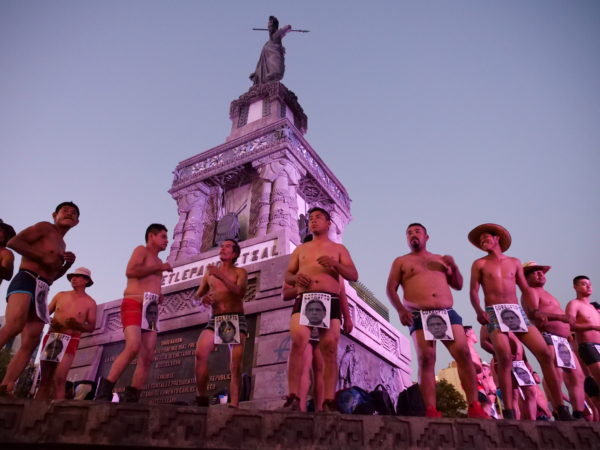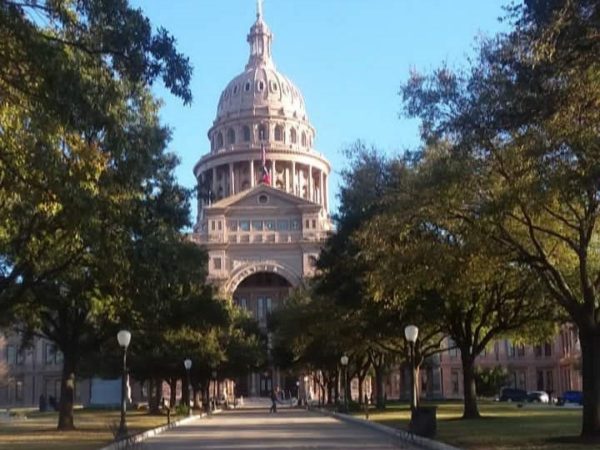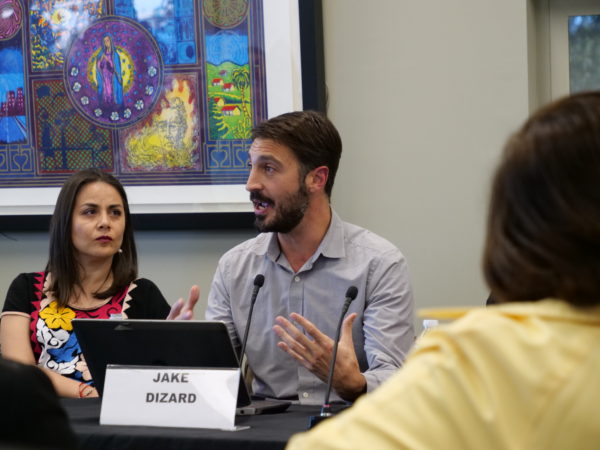(By ANTONIO CUETO)
It is 2 p.m. on a sunny 75 degree day in downtown Mexico City. The traffic is piling up on Reforma, Mexico City’s main avenue. A group of men wearing nothing but underwear and a picture of Veracruz’s ex-governor Miguel Angel Yunes with the word “corrupto” covering their private parts dance to the rhythms of cumbia playing from loudspeakers on the intersection of Insurgentes and Reforma.

(ACC Star photo by Antonio Cueto)
Pedestrians walk along the boulevards adjacent to the street, some fight their curious urge to stare, while others laugh and cheer as they watch the spectacle enfolding before their eyes. From the streets, drivers honk in a playful manner, adding to the atmosphere of what feels like the most bizarre party in the middle of the busiest street in the Mexican capital.
It’s a surreal sight that looks like a scene straight out of an Alejandro Jodorowsky movie, catching the foreign eye by surprise. However, for many locals, this has been a familiar sight for more than four decades.
“The first time I saw them, it was all naked women dancing outside Bellas Artes,” Andres Martinez said, a Mexico City native studying political science at the University of California, Berkeley. “It was five years ago. I was walking downtown with my dad when we suddenly saw all these people dancing, while everyone on the sidewalk laughed at what was happening.
“It wasn’t a nuisance, but it was definitely unexpected to see women completely naked in public. Especially in Mexico City,” Martinez said.
The group of dancers referred to as “los encuerados” (the naked ones) by the locals is part of the activist group known as the movement of the “400 Pueblos.” They fight for land, peasant workers rights, and justice for the abuses of government in their native Veracruz.
The movement dates back to 1970, when a multitude of 1,000 peasants from various indigenous communities and political parties in Veracruz organized a march from the town of Coatepec to Mexico City in support of land rights that had been taken away from them by the government. The military halted the march in Tlaxcala. Arrests of organizers were made under the pretense of carrying guns (illegal at the time in Mexico).
The arrested members were detained in a military base for 19 days, until they were let go because the charges were dropped. They regrouped back in Veracruz to officially establish the movement to denounce the unjust arrests that were carried out with the purpose of disbanding the march, according to longtime organizer Cesar del Angel.

(ACC Star photo by Antonio Cueto)
Del Angel, who is now 79 years old, has been with the movement since its inception. Though he is unofficially known as their leader, del Angel refers to himself as a political assessor. He claims that the group is autonomous and democratic, meaning that all decisions are made by assemblies where every attendee has equal weight to their voice and vote. Del Angel is closer to a spokesman for the group.
“We fight against the impunity carried out by the government,” del Angel said. “We want the new government to fulfill their promises of creating an national agrarian economy, and of putting an end to corruption.”
The group is known around the world for their unconventional protesting tactics. Other activist organizations have mimicked their strategies, which are particularly popular with feminist groups in Europe.
“In Mexico, you need at least 5,000 people in a movement to be noticed by the government,” del Angel said with a playful smirk. “We don’t have that many people, so instead we get naked to attract attention to our cause.”
They still reside in Veracruz, where they work the lands that the government has given them over the years thanks to their successful lobbying.
Every time a new issue arises that the movement determines to be a violation of power from the government, they return to the capital to protest until a hearing is granted with the federal government to negotiate their demands.
Today, there are currently about 300 men dancing on the street. They are in the Mexican capital once again to seek justice for the unfair arrest of Cesar del Angel himself during the last presidential election cycle. He was released in January of this year.
Though he did not specify what the charges were, del Angel said he has been arrested multiple times during the elections as a way to silence the group and prevent any disruption in the capital that might stain the image of the party seeking to stay in power.
On this occasion, the man who del Angel accuses of having ordered his unjust arrest is Miguel Angel Yunez, ex-governor of Veracruz. Yunez belongs to the “Partido Revolucionario Institucional” (PRI) party, which was in power from 2012 until 2018 under President Enrique Peña Nieto.
“All the charges they have pressed, have been fabricated,” del Angel said. “The government cannot touch us because we have not done anything illegal. We protest in a peaceful manner and the people of Mexico knows this.

(ACC Star photo by Antonio Cueto)
“We may not have everyone’s approval, but our fight has always been successful. We play cumbia from loud speakers because it gives us life. One needs a lot of strength and bravery to do what we do. We sleep on the streets when we are here, and we live off of people’s charity.”
Though the demonstrators were only in the capital for two days at the time of publication, their presence had already been acknowledged by the city’s government. They were granted a hearing with the new federal government headed by President Andres Manuel Lopez Obrador
from the Morena party.
“I have faith in my people, not in the government,” del Angel said smiling. “This time, the government’s platform coincides with what we want for the country, so we will fight to make sure they fulfill their promises.”




